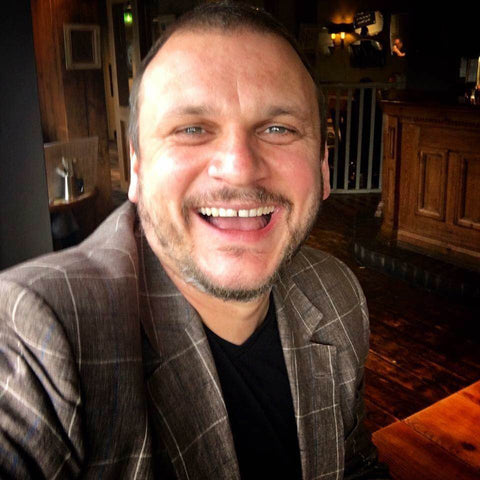Aaron Yorke, A Father on The Spectrum - Whose Son Is Also On The Spectrum - Shares Advice for Teachers And Parents
“So little is understood about social disability and how it impacts the sufferer and those around them, so the first step in helping them to adjust and develop is to accept them for who they are”. This is the advice that Aaron gives to all parents and teachers.
A DIFFICULT AND MISUNDERSTOOD CHILDHOOD
When you talk to Aaron, he’s friendly, approachable and very easy to talk to but he’ll be the first to tell you that not every day is like that. Aaron recalls his childhood and how he didn’t always feel that he fitted in. He recalls how he remembers being reprimanded for being ‘naughty’ and told to calm down most of the time. He was often fixated on things, easily excitable and suffered anxiety attacks - especially in large social groups. As a child, he struggled more during his secondary school years. Aaron had lots of mental health issues and could not cope with the pressures of mainstream education. He got into trouble and would avoid school whenever he could. He recalls how his mother was blamed for being a bad parent. He also remembers how he was repeatedly told he was mad, crazy, stupid or selfish. He says that the school must have tried to help as he had a lot of psychologists and psychiatrists who would visit him at school and at his home. He ended up in therapy for many years, but nothing seemed to really help.
LIKE FATHER LIKE SON
As a teenager he had acute levels of anxiety and depression and was in a constant sense of confusion. As a result of this not going away, when Aaron was a young adult he did a degree in psychology in the hope it would help find his identity and maybe some answers as to why he was different and struggling with so much mental health. Sadly, it didn’t. By the time he’d finished his degree, his 4 year-old son Cameron started to exhibit similar behaviours to those Aaron did as a child.
Cameron wasn’t coping well with nursery school either. But it wasn’t Aaron that noticed it at first (he thought it was ADHD). His family kept telling him “you were like that as child”, and “you behaved the same way as Cameron when you were a kid”. At 4 years old, Cameron was diagnosed with autism and what followed was years of battling to find the right school for Cameron that could give him the emotional support he needed.
ADULT DIAGNOSIS BRINGS LITTLE RELIEF
In the meantime, Aaron was seeing a psychiatrist in Birmingham who had a vested interest in him. He was seen as treatment resistant and with so many health issues, the psychiatrist had to think outside the box. After several assessments, he was advised to see a child psychiatrist and it wasn’t till he was 30 and after Cameron’s diagnosis that he was diagnosed with high functioning autism, OCD, depression and agoraphobia. His mother was asked to join the assessment, but neither got the clarity they thought it would bring. Aaron’s mum loved Aaron regardless of the diagnosis and it made little difference to her. Aaron puts that down to believing his mum was one of the very few that really understood him. For Aaron it brought more confusion that caused him to flip the other way. It affected his self-esteem and he questioned himself more than ever. For example, when he thought he understood people and believed he knew what someone else was saying or thinking, it would turn out to be the opposite. This escalated his anxiety.
USING HIS OWN CHILDHOOD EXPERIENCES TO HELP OTHERS
Aaron will tell you “he doesn’t look special” and most people can’t see his autism. He easily makes eye contact and has empathy, he cares, can hold down a job, be married and yes, can do math. In the past, teachers and therapists alike were not skilled enough to recognise behaviours and the needs of a child. He believes that the ‘Rain Man’ stigma is still so strong that people’s views have been slow to change. In Aaron’s experience that is the minority.
Although he has many talents including photography and music, Aaron’s prime role today is working with Birmingham City schools as an Autism advisor in a department specialising in communication disorders. No day is ever the same and he can have up to 40 children on his books who he supports. He has found a way to bring his own experience as a child, an adult and a father on the spectrum to hundreds of children to help them navigate varying social situations.
ANXIETY? LOW SELF-ESTEEM? UNDERSTANDING DIFFERENT TRIGGERS
He understands the triggers that can set someone on the spectrum off. For example, he knows of himself that the anxiety stems from low self-esteem whereas in Cameron it stems from high levels of stress and expectations, leading to him wanting to escape any given situation. Children with autism often use escape strategies because all they want to do is get out of the situation they’re in because they aren’t able to express how they’re feeling.
Aaron believes the solution is a lot simpler than people realise. The first step is to accept the child for who they are. He says, “Everyone understands physical disability and will make accommodations such as widening doors and putting in ramps for those in a wheelchair, but because you can’t see a social disability, we don’t know how to accommodate properly. Therefore similar modifications aren’t being done…sadly, we still then expect the young person to change.”
Aaron never saw Cameron as having a problem or even being autistic – the mutual understanding they have between them comes from giving each other the space to cope with their anxiety how they see fit. Aaron recalls how “schools didn’t understand Cameron’s need to escape as they had to prevent him for running out of school to escape for a time out”.
Aaron lights up when he tells me how proud of his son’s maturity for recognising his own needs at such a young age. In the past Cameron has seen many doctors through CAMHS and at one point the one psychologist he was making progress with was taken off the case, causing Cameron’s anxiety to spiral again. Aaron recalls that many of the schools could have done so much more but now realises that teachers aren’t equipped with the tools to manage it. “It was a big gap then, and it’s still a big gap now!”
Would Aaron do anything differently with Cameron than was done for him as a child? “Not really”, says Aaron. Other than fighting his corner when it comes to schooling, he lets Cameron be Cameron and they have a mutual understanding when each other needs down time to deal with their anxiety. At 17, Cameron has a pretty good understanding of his needs and when in social surroundings or events that could potentially overwhelm him, he comes prepared with headphones and podcasts that allows him the space he needs.
ADVICE TO PARENTS WITH A CHILD WITH SPECIAL NEEDS
When asked what 4 tips Aaron would give to a parent who has a child who struggles at school, here is what he suggests:
- Keep in check how they are doing emotionally. Aaron suggests that parent(s) could speak about a particular event of the day and how it made them feel, either good or bad, which then allows the child to express how they are feeling in a way they can maybe relate to.
- There’s no point in telling a child who shows repetitive behaviour to stop doing so. They can’t help it, so you need to give them the space to express their emotions in order to deal with it effectively.
- Tell your child how much you love them and how amazing you think they are. Aaron acknowledges that it can be tough particularly for dads to tell their son how they feel but says it’s very important for the child’s self esteem.
- It is important to identify what their special interest is and develop that. Removing computer games isn’t always the best solution and doesn’t solve anything. Aaron sees all to often when parents celebrate a child’s ability to kick a ball for hours but when a child sits in front of a computer game, it is seen as lazy and unproductive when it is the same thing. “It’s irrelevant what the interest is, just accept them for who they are”, says Aaron.
USEFUL LINKS
Other than his role as Birmingham City advisor, Aaron has a passion for music and photography. So if you’re looking for a Portrait or Wedding photographer with a creative flair, please get in touch with Aaron info@incirclesphotography.com



